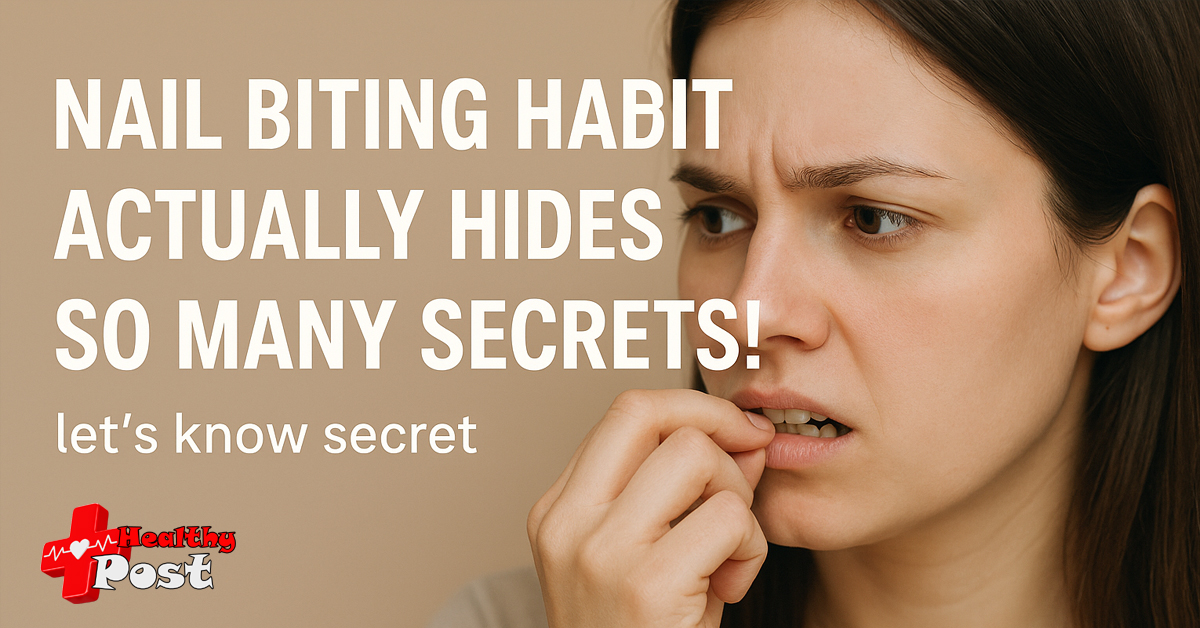
Nail biting habit actually hides so many secrets! let’s know secret
Nail biting is a common bad habit that can be caused by a variety of reasons and may have some adverse effects. Here is a detailed analysis of the habit of nail biting:
1. Reasons for biting nails
Psychological factors
Stress and anxiety: Nail biting can be a way to relieve stress, tension, or anxiety. For example, students may bite their nails before an exam or adults may bite their nails when they are stressed out at work. Major changes in life or relationship problems may also trigger anxiety, leading to nail biting.
Boredom: When people are bored, nail biting can be a subconscious behavior to pass the time. For example, some people may start biting their nails during a long meeting, lecture, or while waiting.
Habits and imitation: If children grow up seeing others biting their nails, they may imitate the behavior and develop a habit. Children are more likely to develop this habit if there are parents or siblings biting their nails in the family environment.

Nutritional deficiencies: Certain nutrient deficiencies may be associated with nail biting. For example, deficiencies in trace elements such as iron and zinc may lead to pica, including nail biting. Studies have shown that the incidence of nail biting may increase in patients with iron deficiency anemia.
Neurological problems: Some neurological problems, such as attention deficit hyperactivity disorder (ADHD) and obsessive-compulsive disorder (OCD), may be associated with nail biting. People with these disorders may have repetitive movements that are difficult to control, and nail biting is one of them.
2. The adverse effects of nail biting
Effects on the body
Nail damage: Frequent nail biting can cause nails to deform, shorten, and become brittle, and may even cause the skin around the nails to break and bleed, increasing the risk of infection. Long-term nail biting may also lead to paronychia , which manifests as redness, swelling, and pain around the nails. In severe cases, treatment may be required.
Oral problems: When biting nails, the bacteria on the nails may enter the mouth and cause oral infection. In addition, biting nails may damage teeth, causing them to wear and loosen, affecting oral health.
Digestive problems: If you accidentally swallow your bitten nails, it may cause harm to your digestive system. The nails may scratch your esophagus or gastrointestinal tract, causing pain, bleeding, and even serious problems such as intestinal obstruction.
Psychological impact
Damaged self-confidence: The habit of biting your nails may make people feel embarrassed and unsure, especially in social situations. This bad habit may affect one’s personal image, reduce self-confidence, and have a negative impact on mental health.
Increased anxiety: Although it may relieve anxiety in the short term, in the long term, this behavior may increase anxiety because nail biting itself may become a new source of anxiety, trapping people in a vicious cycle.

How to overcome the habit of biting nails
Awareness of the problem
First of all, you need to realize that it is a bad habit and understand the adverse effects it may bring. You can improve your awareness of this problem by observing yourself and recording the frequency of nail biting.
Finding Alternative Behaviors
When you have the urge to bite your nails, try replacing it with other behaviors. For example, you can hold a small object, squeeze a stress ball, do finger stretching exercises, etc. These alternative behaviors can help distract you and reduce the urge to bite your nails.
Cultivating hobbies is also a good way, such as painting, handicrafts, reading, etc., to keep your hands busy and reduce the chance of biting your nails.
Relieve stress and anxiety
Learning to cope with stress and anxiety is key to overcoming your nail biting habit. You can try relaxation techniques such as deep breathing, meditation, and yoga to help relieve tension.
Proper time management, adequate sleep and rest, and proper exercise can also help reduce stress and anxiety.
Maintain good living habits
Keeping your nails clean and neat and trimming them regularly can reduce the urge to bite your nails. Avoid letting your nails grow too long or become untidy, which can cause discomfort and make you want to bite your nails.
Eat a balanced diet and ensure adequate intake of nutrients, especially trace elements such as iron and zinc. If you suspect nutritional deficiencies, consult a doctor for examination and supplementation.
Seek support
Tell your family, friends or colleagues that you are working hard to overcome the habit of biting your nails, and ask for their supervision and support. They can remind you when you have the urge to bite your nails, or give encouragement and affirmation.
If your nail biting habit seriously affects your quality of life or is related to psychological problems, you can consider seeking help from a professional psychologist. They can help you change bad habits and deal with underlying psychological problems through methods such as cognitive behavioral therapy .
In short, it takes time and effort to overcome the habit of biting nails. By recognizing the problem, finding alternative behaviors, relieving stress and anxiety, maintaining good living habits, and seeking support, you can gradually get rid of this bad habit and maintain physical and mental health.

